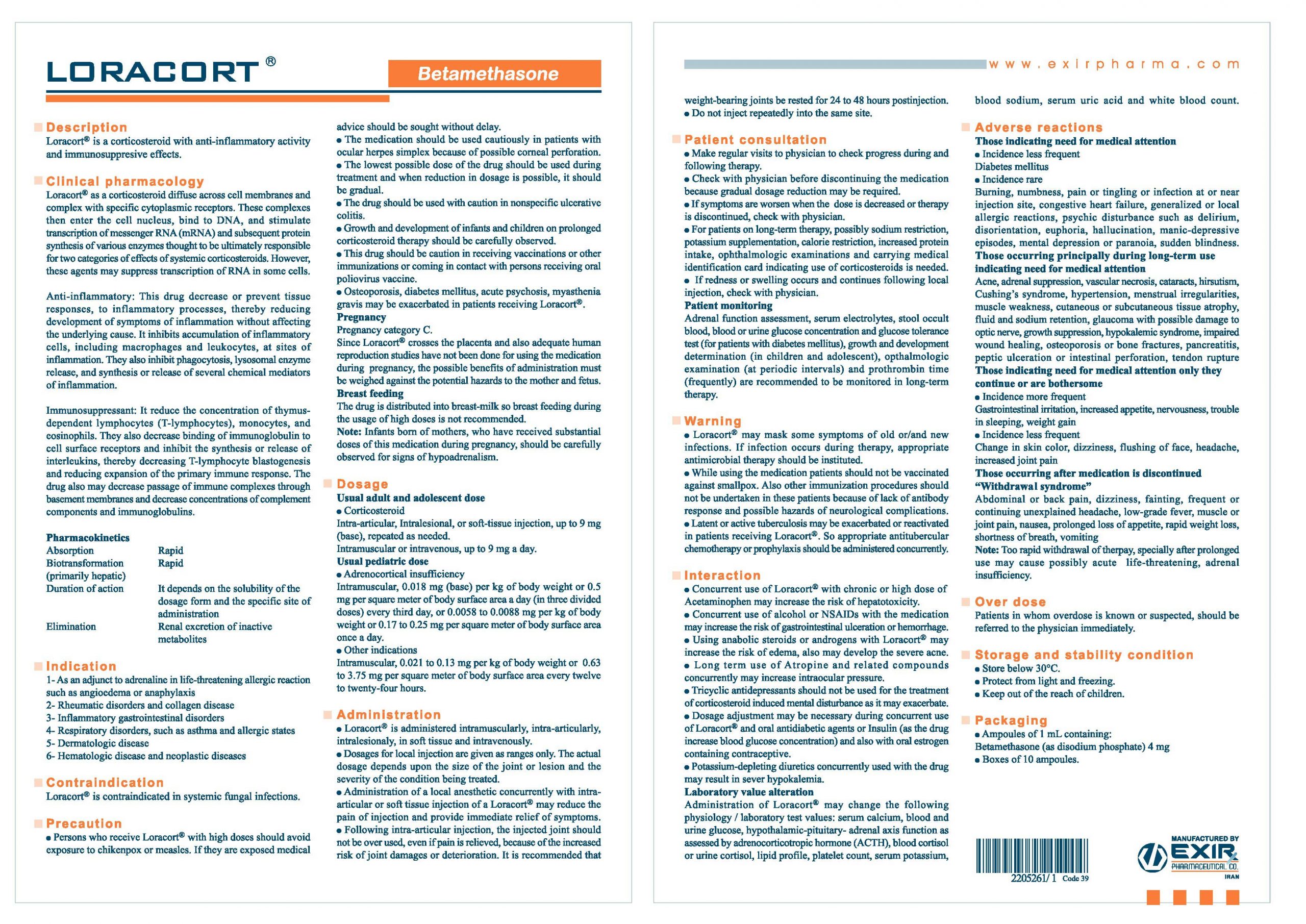BETAMETHASONE L.A.-EXIR
ampoule Betamethasone L.A. ( 1ml )

| Generic Name of Product | Brand Name | Dosage Form | Strength | Pharmacologic Group | Therapeutic Group | Unit Per Pack |
| Betamethasone L.A. | Loracort L.A.® | Ampoule | 1 ml | Glucocorticoid | Corticosteroids | 10 |
Indications And Usage | Allergic States, Dermatologic Diseases. Endocrine Disorders, Gastrointestinal Diseases, Hematologic Disorders, Miscellaneous, Neoplastic Diseases, Nervous System, Ophthalmic Diseases, Renal Diseases, Respiratory Diseases, Rheumatic Disorders |
Administration | Infants up to 1 year may be given 1mg betamethasone intravenously; children aged 1 to 5 years, 2mg; 6 to 12 years, 4mg (1ml). This dose can be repeated three or four times in 24 hours, depending upon the condition being treated and the patient's response |
Contraindications | Hypersensitivity to the active substance or to any of the excipients, Systemic infections, unless specific anti-infective therapy is employed, Betamethasone Injection contains sodium metabisulphite (0.1% w/v) as a preservative and therefore should not be used to treat patients with known hypersensitivity to bisulphite, metabisulphite. Betamethasone Injection should not be injected directly into tendons. |
Precautions | Osteoporosis (post-menopausal females are particularly at risk), Hypertension or congestive heart failure, Existing or previous history of severe affective disorders (especially previous steroid psychosis), Diabetes mellitus (or a family history of diabetes), History of, or active, tuberculosis, Glaucoma (or a family history of glaucoma), Previous corticosteroid-induced myopathy, Liver failure - blood levels of corticosteroid may be increased, as with other drugs which are metabolised in the liver, Renal insufficiency, Epilepsy, History of, or active, peptic ulceration, Herpes simplex keratitis, Diverticulitis, Thromboembolic tendencies. |
Adverse Reactions | Increased blood sugar level. Trembling, dizziness, weakness, fatigue, and fast heartbeat. Low potassium level, which can cause muscle pain and cramps. Skin changes. Signs of infection. Mood and behavior changes.Menstrual changes, such as spotting or skipping a period.Vision changes, including blurred vision.Headaches Weight gain. Sweating.Restlessness.Nausea |
Pregnancy and lactation | Studies have shown a higher rate of palates when steroids are given to pregnant animals. However, there are no adequate studies to tell us whether this occurs in humans. If you’re pregnant or planning to become pregnant, talk to your doctor. This drug should be used only if the potential benefit justifies the potential risk to the fetus. Betamethasone can pass through breast milk and may slow growth in a developing child. Betamethasone may also decrease the amount of breast milk that your body produces. |
Renal and liver Impairment | blood levels of corticosteroid may be increased, as with other drugs which are metabolised in the liver. Renal insufficiency. |
Laboratory Tests | - |

| Generic Name of Product | Brand Name | Dosage Form | Strength | Pharmacologic Group | Therapeutic Group | Unit Per Pack |
| Aprepitant | Emexir® | Capsule | 80 mg + 80 mg + 125 mg | Neurokinin -receptor antagonist, Antiemetic | Gastrointestinal agents | 3 |
Indications And Usage | Prevention nausea and vomiting associated with highly and moderately emetogenic cancer chemotherapy in adults and adolescents from the age of 12.
Aprepitant 125 mg/80 mg is given as part of combination therapy |
Administration | The hard capsule should be swallowed whole. Aprepitant may be taken with or without food |
Contraindications | Hypersensitivity to the active substance or to any of the excipients. with pimozide, terfenadine, astemizole or cisapride. |
Precautions | Aprepitant should be used with caution in patients receiving concomitant orally administered active substances that are metabolised primarily through CYP3A4 and with a narrow therapeutic range, such as cyclosporine, tacrolimus, sirolimus, everolimus, alfentanil, ergot alkaloid derivatives, fentanyl, and quinidine Additionally, concomitant administration with irinotecan should be approached with particular caution as the combination might result in increased toxicity. |
Adverse Reactions | Tiredness, hiccups, nausea, vomiting, heartburn, stomach pain, diarrhea, constipation, loss of appetite, hair loss, headache, dizziness, mild skin rash, ringing in your ears, sleep problems (insomnia). |
Pregnancy and lactation | For aprepitant no clinical data on exposed pregnancies are available aprepitant should not be used during pregnancy unless clearly necessary. Aprepitant is excreted in the milk of lactating rats. |
Renal and liver Impairment | There are limited data in patients with moderate hepatic impairment and no data in patients with severe hepatic impairment. Aprepitant should be used with caution in these patients |
Laboratory Tests | - |
